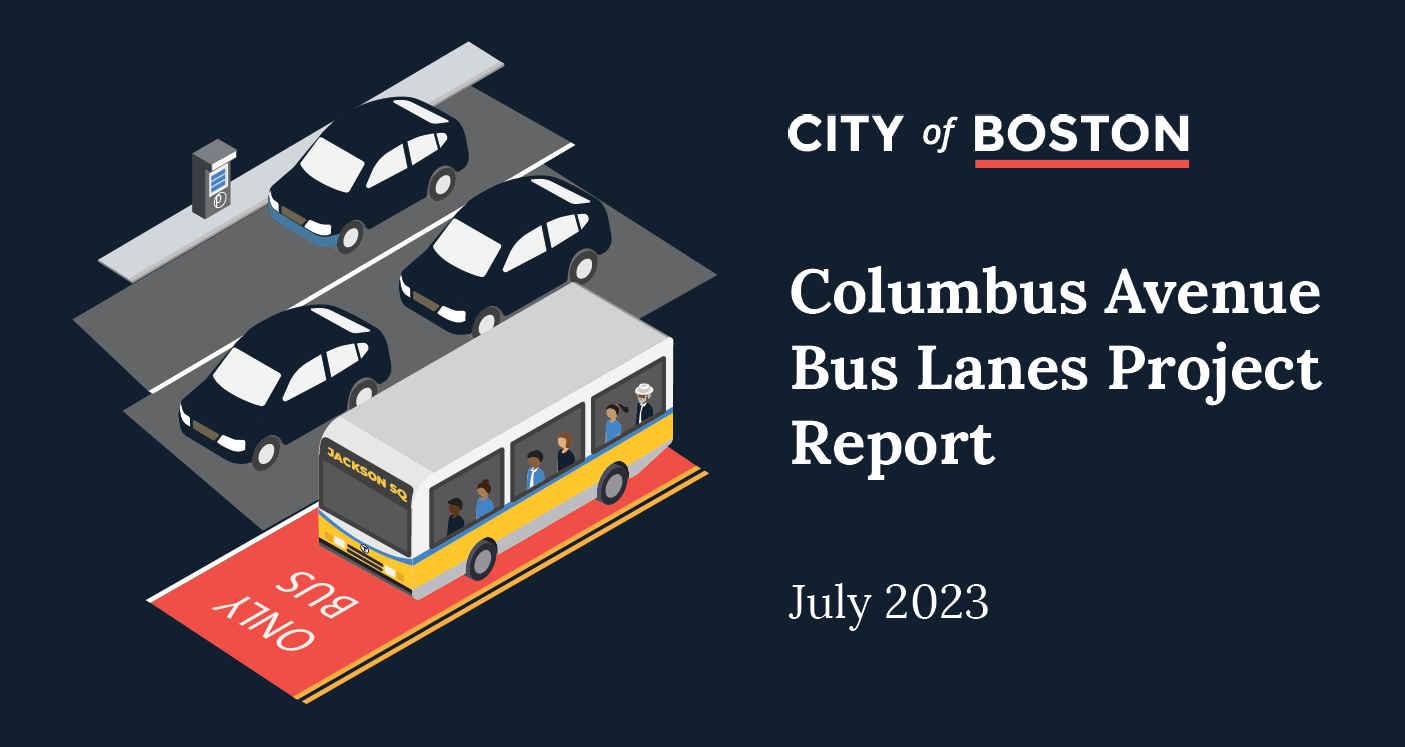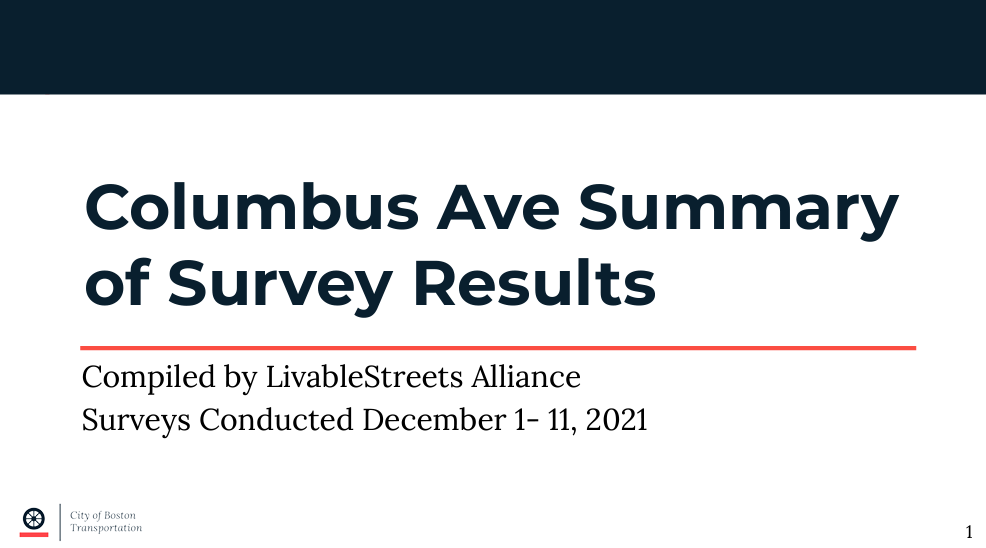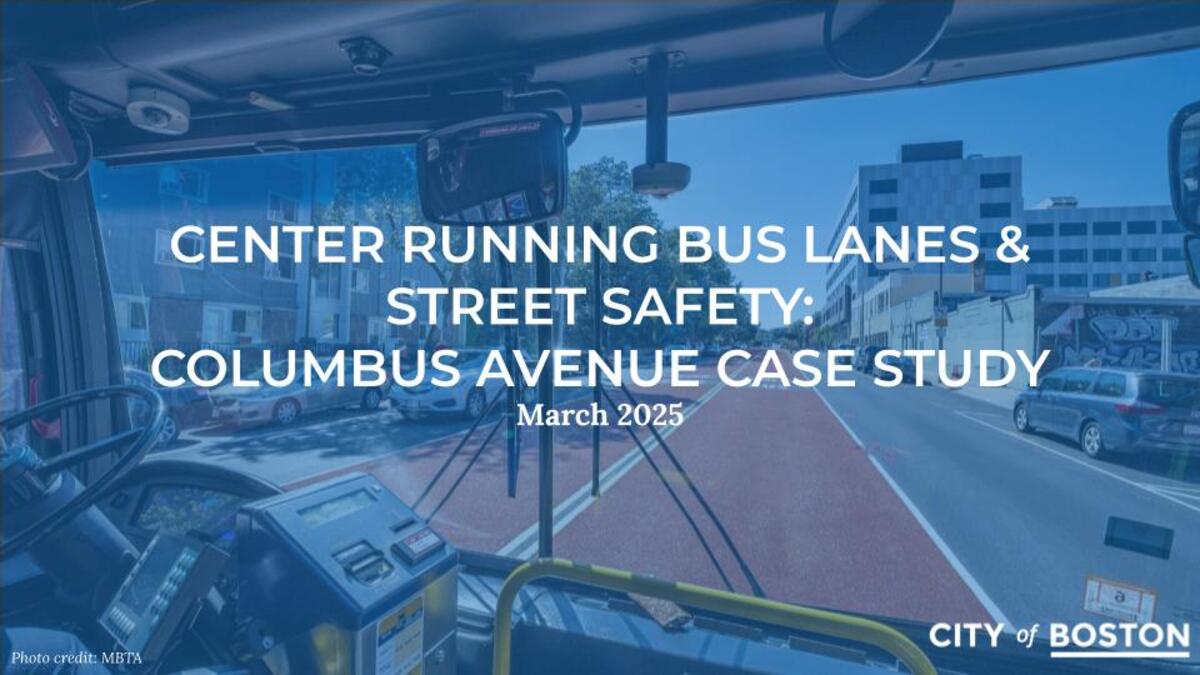Columbus Avenue Bus Lanes
Boston's first center-running bus lane is now in operation on Columbus Avenue.
The Columbus Avenue bus lane, the first center-running bus lane in New England, is now open and operating! In partnership with the MBTA, the City of Boston has implemented a range of improvements to Columbus Ave that will benefit bus riders, pedestrians, and the neighborhood as a whole.
The project makes the following improvements:
- New center-running bus lane from Jackson Square to Walnut Avenue
- Pedestrian safety and accessibility improvements, including new crosswalks, ramps, curb extensions, and safer crossings at the new stops
- New island platforms for bus stops with amenities including canopies and real time arrival signage
By having dedicated bus lanes in the center of the street, conflicts with traffic and parked vehicles are removed. We're helping buses run faster and more reliably.
Read more about how the Columbus Ave bus lanes are performing in our project report!
COLUMBUS AVE BUS LANES PROJECT REPORT
The City wanted to know how well the Columbus Avenue bus lanes are working, so we commissioned a report to look at the data. Here are some of the main findings:
- During rush hour, the bus lanes save riders about 3 to 4 minutes each trip, or about 7 minutes a day
- Added up up across all riders, the bus lanes save the equivalent of 81 hours each day, or the amount of time it takes to drive to Los Angeles and back again
- After the Columbus Ave bus lanes, about 10% more vehicles are obeying the speed limit
- After the Columbus Ave bus lanes were built, it takes an average of about 20-40 more seconds for people to drive the corridor
- Want to learn more and see the full findings?
COLUMBUS AVE BUS RIDER SURVEY
We wanted to learn how the Columbus Ave center-running bus lanes are working for riders, so we went out and asked!
- Over 78% of riders were satisfied with the bus lanes
- 74% of riders reported that their trips were faster
- 74% of riders said their trips were more consistent
- 82% of riders felt safe reaching the bus platform
- Want to know more about what riders said?
CENTER RUNNING BUS LANES and STREET SAFETY: COLUMBUS AVENUE CASE STUDY
Inspired by our colleagues study of roadway safety on corridors with bike lanes, we wanted to investigate the impact of our first center-running bus lane project on overall street safety.
We found that Columbus Avenue saw a 27.63% decrease in roadway injuries, a 7% larger greater decrease than similar roads across the City.
Public meeting materials
Hearing materials- Columbus Avenue Transportation Improvements Virtual Public Meeting #1 ( July 20, 2020)
- Columbus Avenue Transportation Improvements Virtual Public Meeting #2 (July 20, 2020)
- Reunión pública sobre mejoras de transporte en Columbus Avenue #1 (July 21, 2020)
- Reunión pública sobre mejoras de transporte en Columbus Avenue #2 (July 21, 2020)
Background
In 2019, the Transportation Department developed the Jamaica Plain and Roxbury Transportation Action Plan. This plan advances the recommendations featured in the Boston Planning and Development Agency’s PLAN: Jamaica Plain Roxbury, and Go Boston 2030.
From the Transportation Action Plan, we identified several community interests as high priorities for residents. Those interests include:
- Columbus Avenue Transit Improvements
- Washington Street Traffic Calming, and
- Egleston Square Safety Improvements.
Nearly one-third of those traveling on this section of Columbus Avenue move on buses. Delays became so severe that travel times can triple during peak travel times. It should be no surprise that dedicated bus lanes on Columbus Avenue rose to the top of community interests.
This initiative closely aligns with our goals toward decreasing travel time inequities across racial lines and transportation modes in Go Boston 2030.
Improvements
The new center-running bus lanes will provide bus riders with more reliable service. We also upgraded bus platforms within the project scope.
These upgrades will benefit riders on the three bus routes on the corridor:
- 22: Ashmont Station – Ruggles Station
- 29: Mattapan Station – Jackson Square Station, and
- 44: Jackson Square Station – Ruggles Station.
In 2019, there were 25 reported crashes along the street segment. Four of those crashes involved pedestrians. Through this project, we can improve the safety for those walking along Columbus Avenue. We created improved street crossings for pedestrians and improved accessibility for pedestrians with disabilities.




